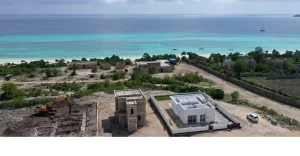
Dar es Salaam. Zanzibar’s President, Dr Hussein Mwinyi has officially launched the Sukuk bond seeking to raise Sh1.1 trillion to fund development projects.
Sukuk Bond is a financial product whose terms and structures comply with sharia and is designed to address funding challenges facing the execution of development projects in the Isles.
Unlike conventional bonds that involve paying interest, Sukuk avoids interest payments and is structured according to Islamic principles of fairness, ethical investing, and profit-sharing.
Projects to be funded by the Islamic bond include the construction of Terminal 4 at Abeid Amani Karume International Airport, housing developments in both Unguja and Pemba, the construction of a modern fish market, and the purchase of large fishing boats.
During the live broadcast event on Saturday, February 22, 2025, Dr Mwinyi said the current budgetary system is insufficient to fund ongoing development projects, prompting the government to seek alternative funding sources aligned with Sharia principles.
He noted that many developing countries, including Malaysia and Nigeria, have successfully adopted similar systems for funding strategic projects.
“After thorough analysis and recognising the needs of the people, the government has decided to adopt this system,” he said.
“Development banks, including the World Bank, the International Finance Corporation (IFC), and the Islamic Development Bank, have long used this approach, which has attracted many investors,” he added.
He highlighted Malaysia as an example of successful implementation and noted that while other countries are making progress, Zanzibar and East Africa are still lagging, despite having a large population eager to invest.
Furthermore, he noted that the Sukuk bond is the first of its kind, not only for Zanzibar but also for all East African Community (EAC) countries.
According to him, the bond was open to both Muslim and non-Muslim investors with the minimum investment amount is Sh1 million, making it accessible to many.
“I thank all those who have decided to invest in the development of Zanzibar and our economy,” Dr Mwinyi said.
At the event, the Minister of State in the President’s Office (Finance and Planning), Dr Saada Mkuya, explained that Sukuk bonds strictly follow Islamic principles but are open to non-Muslim investors.
She highlighted that many people had inquired about the bond’s launch and its potential to foster rapid development in Zanzibar.
“Some may say we are late, but this is the right time. The economy has grown, and people now need to invest in a way that gives them peace of mind, knowing the system aligns with their faith,” said Dr Mkuya.
Zanzibar’s Minister of Infrastructure, Communication, and Transport, Dr Khalid Mohamed, emphasised that the bond will significantly support the construction sector, which requires funding for numerous projects.
“This bond will set an example for other African countries yet to begin using such a system. It will also help position Zanzibar as a leader in creating financial products that adhere to religious principles,” said Dr Mohamed.
He encouraged both citizens and members of the diaspora to invest in the bond, urging them to avoid saving money at home or investing in unprofitable projects.
“The bond is safe and offers many benefits,” he added.














